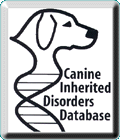
Selective IgA deficiency
Immunoglobulins are proteins that function as antibodies and thus, provide immune protection. Immunoglobulin A (IgA) is important in protecting body surfaces, which include the skin, and the respiratory, digestive and reproductive tracts.
Dogs with IgA deficiency are prone to recurrent infections and the development of allergies (eg. atopy or food allergies) or immune-mediated diseases.
unknown.
Dogs with IgA deficiency usually have problems from a young age. They may have recurring skin, respiratory, gastrointestinal or urinary tract infections. The typical signs you might see include pustules and scratching, sneezing or nasal discharge, prolonged or recurring diarrhea, frequent or painful urination (cystitis - bladder infection).
These dogs are also prone to develop allergies or immune-mediated disorders.
Your veterinarian may suspect an immune deficiency if your dog is having recurring or frequent infections, especially of the skin. S/he will take a blood sample to measure your dog's immunoglobulin levels, which will show reduced or absent IgA.
The various infections, allergies, or autoimmune disorders associated with IgA deficiency are treated as required. Different treatments to stimulate the immune system itself have been tried with varying success.
For the veterinarian: Staphylococcal phage lysate and Propionibacterium acnes vaccine are 2 immunomodulating agents which have been shown to enhance antibody production, and assist in the treatment of recurrent staphylococcal pyodermas in dogs.
Serum IgA levels are low in all puppies, but by 4 months have reached levels where normal and IgA deficient dogs can be differentiated. However serum IgA only reaches maximal levels at 15 to 18 months of age, so it is important to age match when comparing.
Low IgA levels may be found in clinically normal dogs (who likely have normal secretory levels but not serum levels). IgG and/or IgM may be elevated in a compensatory manner. IgA deficiency diagnosed in dogs less than a year of age may be transient.
Affected animals should not be bred, and it is prudent to avoid breeding close relatives as well.
FOR MORE INFORMATION ABOUT THIS DISORDER, PLEASE SEE YOUR VETERINARIAN.
- Disorder Type:

